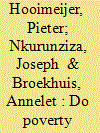| Srl | Item |
| 1 |
ID:
153100


|
|
|
|
|
| Summary/Abstract |
The Rwandan Government has implemented various education policies that contribute to higher enrolment in education, but has become aware that these policies might be less effective for children from poor families. This study investigates the contribution of poverty reduction programmes on education expenditure of households. Using a multi-level regression analysis, combining district data on labour markets with detailed expenditure data on 7,230 households, it teases out the effects of several social protection programmes. The results show that access to health insurance and to waged work are positively related, while direct financial or in kind support are negatively related to paying into the children’s schooling. Non-agricultural employment opportunities in particular seem to stimulate education investments. Reducing the vulnerability of households might provide more equal access to these opportunities.
|
|
|
|
|
|
|
|
|
|
|
|
|
|
|
|
| 2 |
ID:
185145


|
|
|
|
|
| Summary/Abstract |
African countries are urbanizing rapidly, presenting complex challenges for urban waste management. A compelling nexus between urbanization and waste management can be found in Kigali, the capital and largest city in Rwanda. Since its founding in 1907, the city of Kigali has witnessed steady growth in terms of both population and geographical boundaries. Using mainly qualitative methods, this study provides an empirical survey of waste management practices in post-genocide Rwanda with an emphasis on the city of Kigali, the capital. The study analyzed current regulatory arrangements and legislative instruments, approaches to public cleaning, and minimization, collection, and final disposal of wastes. We found Kigali to be an exceptionally clean city with carefully organized and well-coordinated waste management service delivery systems in place. Conversely, the absence of effective minimization strategies, coupled with a lack of safe treatment and disposal facilities, militate against sustainable waste management.
|
|
|
|
|
|
|
|
|
|
|
|
|
|
|
|